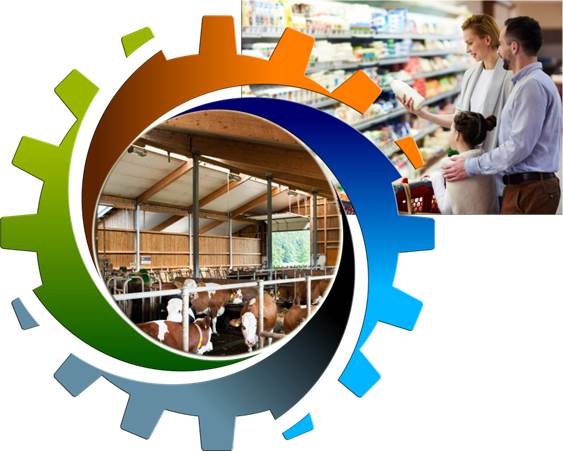The first path leads to the internal optimization of production methods and economic decisions. The second path shows the market economy opportunities that arise from the knowledge-based evaluation of entire production networks. Eco-efficient dairy farming generates its opportunities from the further development of partnerships between providers and the dairy. In this way, the dairy industry is developing beyond the question of quantity and price.
In the holistic approach to eco-efficiency, the dairy, as a process and marketing expert, plays a proportional role in product design and can therefore create better market opportunities, especially for conventional milk production. In the present project, FarmLife with all sub-areas (resources, nutrient and pollutant management, economic efficiency, animal welfare and biodiversity) is introduced into the two independent farming networks of the Obersteirische Molkerei and Gmundner Milch.
A sustainable description of all environmental impacts and production aspects is derived from the results, which provides the basis for the creation of long-term production and market concepts for the dairy. This participatory processing is made possible by external competencies. All sub-goals are geared towards optimizing operations with regard to eco-efficient agriculture and rule-based marketing of products by the dairy.
The concept of eco-efficiency will support a location-adapted and performance-oriented dairy farming able to minimize its environmental effects.
This approach with the farm-management tool FarmLife was tested in a regional group in the project DAFNE 101152 for the first time.
The results clearly show two paths of acting in order to support dairy farming. The first path leads into the internal optimization of production methods and economic decisions. The second path shows the marketing opportunities that arise from a knowledge-based evaluation of whole production networks. Eco-efficient dairy farming generates its opportunities from the further development of the partnership between suppliers and dairy. In doing so it widely surpasses the questions of quantity and price.
In the overall approach of eco-efficiency, the dairy as processing and marketing expert adopts a partial role in the product design and thus lances better market chances especially for the conventional dairy production.
Within this project, FarmLife is introduced with all sub-sections (resource, nutrient and pollutant management, economy, animal welfare, and biodiversity) in two independent networks on farm level of the Upper-Styrian dairy and Gmundner Milch.
From the results a sustainable description of all environmental effects and aspects of production is derived. This description forms the basis for the drawing up of long-term production and marketing concepts by the dairy. This participatory processing is facilitated by external competences.
All partial objectives are aligned to the optimization of farms in terms of eco-efficient agriculture and the rule-based marketing of the results by the dairy.







